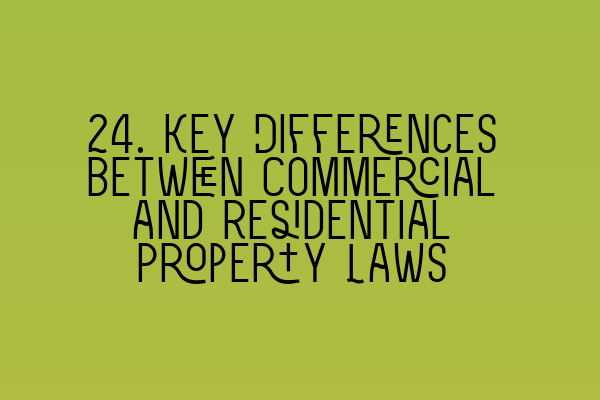24 Key Differences between Commercial and Residential Property Laws
Commercial and residential properties are two different types of real estate investments. While both involve the ownership and use of property, their legal frameworks and regulations differ significantly. As a solicitor specializing in property law, it is essential to understand the key differences between commercial and residential property laws to provide effective legal advice and representation to your clients.
In this article, we will explore 24 key differences between commercial and residential property laws to give you a comprehensive understanding of the distinctions. Whether you are a solicitor, a law student preparing for the SQE exams, or a real estate investor, this knowledge is crucial in navigating the complexities of property law.
1. Purpose of Use: Commercial properties are primarily used for business purposes, such as offices, retail stores, and industrial spaces. Residential properties, on the other hand, are used for living purposes, including houses, apartments, and condominiums.
2. Contracts: Commercial property transactions often involve complex and lengthy contracts due to the higher stakes and intricacies involved. Residential transactions usually have simpler contracts.
3. Lease Terms: Commercial leases are typically long-term and can range from five to twenty-five years. Residential leases are generally shorter, commonly spanning from six months to one year.
4. Rent: Commercial rent is usually higher than residential rent due to factors such as location, size, and commercial viability. Residential rent is determined by factors such as the housing market, location, and amenities.
5. Landlord-Tenant Relationships: The relationship between commercial landlords and tenants is predominantly based on a business-to-business interaction, whereas residential landlords and tenants have a more personal relationship.
6. Regulatory Compliance: Commercial properties are subject to more stringent regulatory requirements, such as health and safety regulations, fire safety codes, accessibility standards, and zoning laws. Residential properties also have regulations but are typically less demanding.
7. Planning Permission: Commercial properties often require planning permission for change of use or major renovations. Residential properties may also require planning permission but not to the same extent as commercial properties.
8. Valuation: The valuation of commercial properties is different from residential properties due to the income-generating potential and investment purpose associated with commercial real estate.
9. Financing: Commercial property financing options typically involve different terms, conditions, and rates compared to residential property financing, as commercial investments carry higher risks.
10. Property Management: Commercial properties often require professional property managers to handle maintenance, tenant relations, and other operational aspects. Residential properties may also have property management services, but many are managed directly by the owner or a smaller management team.
11. Tenant Rights: Commercial tenants have fewer legal protections compared to residential tenants due to the assumption of business expertise and the commercial nature of the relationship.
12. Eviction Process: Eviction laws and processes for commercial properties are typically more complex and involve a lengthier legal procedure compared to residential evictions, which vary by jurisdiction.
13. Lease Negotiations: Commercial lease negotiations are typically more complex than residential lease negotiations due to the involvement of legal and business considerations.
14. Subletting: Commercial tenants often have the right to sublet their space with the landlord’s consent and under specific conditions. Residential tenants usually have limited rights or restrictions when it comes to subletting.
15. Dispute Resolution: Commercial property disputes are often resolved through commercial arbitration or litigation. Residential property disputes are commonly settled through alternative dispute resolution methods or small claims courts.
16. Dilapidations: Dilapidations refer to the obligations associated with the state of repair and maintenance of a property. Dilapidation claims are more commonly made in commercial property leases than in residential leases.
17. Taxes: Commercial properties are subject to different tax rules and regulations compared to residential properties, including business rates and capital gains tax.
18. Landlord’s Right to Access: Commercial landlords typically have greater rights to access the property for inspections and repairs compared to residential landlords, who must provide reasonable notice to the tenant.
19. Guarantees: Commercial leases often require personal or company guarantees from tenants to ensure the fulfillment of lease obligations. Residential leases usually do not require guarantees.
20. Lease Renewals: Commercial lease renewals involve complex legal processes, negotiations, and potential rent adjustments. Residential lease renewals are often simpler with less negotiation involved.
21. Deeds and Licenses: Commercial properties may involve granting licenses or entering into deeds relating to specific rights or uses of the property. Residential properties typically do not require such additional legal instruments.
22. Security of Tenure: Residential tenants often have more statutory protection and rights regarding security of tenure compared to commercial tenants.
23. Access to Legal Aid: Commercial tenants generally have limited access to legal aid compared to residential tenants due to the nature and cost of commercial property disputes.
24. Squatting Laws: Squatting laws and regulations differ for commercial and residential properties, with residential properties often having stronger legal protections against squatting.
Understanding these key differences between commercial and residential property laws is vital to providing expert legal advice to your clients and making informed decisions as a property investor. As a solicitor specializing in property law, having a thorough grasp of these distinctions will enhance your professional expertise and ensure you provide exceptional service to your clients.
If you’re studying for the SQE exams, our SQE 1 Practice Exam Questions and SQE 1 Practice Mocks FLK1 FLK2 articles can help you prepare effectively. For those looking for SQE 2 or SQE 1 preparation courses, check out our SQE 2 Preparation Courses and SQE 1 Preparation Courses. Stay updated with the latest SRA SQE Exam Dates to plan your study and exam schedule effectively.
At SQE Property Law & Land Law, we are committed to helping solicitors and aspiring legal professionals excel in their careers. Contact us for expert guidance in property law or to explore our comprehensive range of legal services.
